I had intended to title this post simply “2020,” and post it before the end of the year. It was intended to be a summary of what we had, at times just barely, survived over the course of the year. But 2020 still strikes out at us when it can, so only now do I have the time to write this.
Looking back now on my March 3rd post in early 2020—my last post before this one, other than the Book 5 preview in December—it feels like a last communication from the before times, from before when everything changed, and a warning of what was to come:
“We—all of us, not just Jeanette and I—are embarked on a very momentous year. The earth’s climate is rushing toward irreversible damage faster than any scientists anticipated, causing ever more frequent extreme, erratic, and destructive weather events. We are, as I write this, in the early stages of what may develop into a dangerous, world-wide pandemic, which could not only cause numerous deaths, but also drive the economies of much of the world, including the United States, into recession. And here, in the United States, we are facing an election which may well determine whether our democracy, as the founding fathers intended it to operate, will survive. We do not seem prepared: our populace is facing these dangerous challenges in a more divided, polarized condition than I have, in my lifetime, ever seen.
We are all in this life together. We must realize that. If we cannot learn to pull together, to try to combat the serious threats we are facing, I do not know what will happen, but I fear things will not end well.”
Covid-19 did in fact become a world-wide pandemic. As I write this today, over two million people have died of the disease world-wide, and over 400,000 of those deaths have been in the United States. And although vaccines have recently become available, it will be months, and hundreds of thousands more deaths, before the pandemic can be considered even somewhat “controlled.” To put the numbers in context, the U.S. has roughly 4.25% of the world’s population, but to date has suffered about 20% of total world-wide deaths from the pandemic. There is no way to white-wash this: in the United States, we botched it badly. Thousands, probably hundreds of thousands of U.S. citizens died unnecessarily. The pandemic was always going to be horrible, and a struggle. It was made far worse by the incredible incompetence of Donald Trump and his administration. They have the deaths of thousands on their hands.
My March 3rd statement that the United States was facing an election that “may well determine whether our democracy…will survive” may have seemed to many who read it at the time as over the top alarmism. Yet what have we all lived through since then? An election that has been repeatedly certified by state and federal officials as clean, fair, and essentially problem free, was repeatedly challenged by Donald Trump as fraudulent. When, in over 60 cases, numerous state and federal courts, including the U.S. Supreme Court, did not agree, Trump incited his followers—those who chose to blindly accept his lies over the readily available, widely accepted truth—to violently attack the U.S. Congress, in an act of insurrection.
For now, just barely, this country has survived as a democracy. Whether it will continue to will depend upon us all. It is alarming that despite clear, convincing, and readily available evidence to the contrary, millions of Americans chose instead to believe the lies told by Trump and his enablers—including numerous Republican members of Congress, and conservative media, especially the Fox News Channel—that the election was somehow fraudulently stolen from him. As I have written before, it is a terrible danger that there is no longer a single, commonly accepted “truth” in this country.
But let me take this year-end summary back down to a personal level. 2020 was a terrible year for the world, for everyone in it. My heart goes out to all who lost loved ones to the pandemic, who are facing financial struggles or even ruin due to the ravages the pandemic has battered the economy with. For Jeanette and me, it was a very hard year, too. This is our story.
In “normal” years, we measure how the year went by how our garden did—we put much effort into it, and a large percentage of what we eat comes from it. Another measure is how our herd of heritage Soay sheep fared.
When the year began, even despite the gathering storm clouds of the pandemic, it looked likely to be a good year for the farm. Our pastures were the lushest they had been in years, after several years of drought. The spring brought us a healthy crop of new lambs, and a good start to the garden.
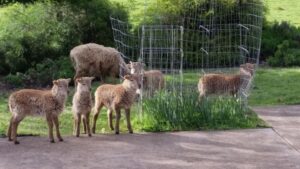
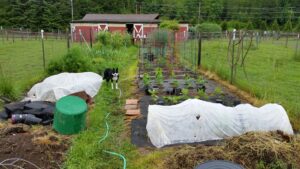
Unfortunately, it was the calm before the storm.
In late February, while pruning a tree, I injured my shoulder. At first, I thought it was just tendonitis, a recurring problem I’ve had since we moved to the farm. But when it did not heal, I sought medical assistance, and in March learned, from an MRI exam, that one of the four tendons in my right shoulder joint had ripped loose from the arm bone. It was, at the time the MRI result was reported to me in late March, surgically repairable. Unfortunately, I received the diagnosis two days after all non-essential surgeries were temporarily banned in Oregon, to preserve essential medical supplies.
I did, eventually, receive the needed surgery on my shoulder, in late May of 2020. But whether that particular type of injury can be surgically repaired is time sensitive: if too much time passes, the detached tendon atrophies, and there is no longer anything to reattach to the bone. When the surgeon got inside my shoulder joint, that is what he found (and with 20-20 hindsight, he should have ordered another, updated MRI before proceeding with the surgery). I ended up with a shoulder that now not only is permanently damaged, in that certain ranges of motion are no longer possible due to the missing tendon, but also that was further weakened and damaged by the multiple incisions into the shoulder muscles during the surgery. I am frankly still at a loss to understand why, when he realized the situation, the surgeon did not just back out without doing additional damage.
Back to the garden. The theme of 2020 as the year of the plague carried over. Our garden was hit with multiple plagues of destructive pests. In prior years, during the spring and early summer we could typically harvest almost a cup of raspberries every morning, to enjoy with our breakfast, when we walked up to do our morning chores with the chickens and sheep at the barn. This year, our garden was overrun with an explosion of population of voles, small, rat-like rodents that live in tunnels underground. Most of the new shoots of raspberry canes that grow in the spring and produce fruit were eaten off at ground level by the voles. The canes that did survive and produce fruit were scoured clean every day by swarms of starlings, the bird equivalent of rats. We literally did not harvest a single raspberry from the spring crop.
The voles hit many other crops hard, as well. We have an eight-year-old asparagus patch that normally produces quite prolifically. In 2019, we enjoyed fresh asparagus from April through late July. Although the crop started strong in the spring—and the asparagus patch is surrounded by a low, wire-mesh fence, to in theory protect it from pests—the voles discovered it, tunneled under the fence, and quickly began eating new shoots off as soon as they appeared above the ground. But their damage went far worse than that. When growing asparagus, every year you let a certain number of the shoots grow up into tall—about four or five feet high—fern-like plants, that over the course of the summer give nourishment to the asparagus roots and crowns underground, that produce the crop each year. In normal years, by mid-summer our asparagus patch looks like a fern-like hedge along one side of the garden. But this year, the voles not only ate the new shoots, they also cut down and ate all of the ferns. By late summer, there were none left, and the patch itself was filled with their tunnel openings, worrying us that they may have eaten the roots and crowns as well. We will not know until the coming spring whether we even still have a viable asparagus patch, or if it was destroyed.
Besides the asparagus, the voles ate probably 50% of our pepper crop—sometimes we’d walk into the garden and see them, climbing up on the plants and gnawing at the fruit—and at least 30% of our eggplant. In the orchard, although we were on track in early summer to have our best harvests ever of peaches and pears, in the end we lost at least half of both crops to birds (starlings again, but also crows, which felt like a betrayal, given our long-running relationship with our local flock of crows), and our entire cherry crop.
But the garden travails actually proved to be the least of our struggles in 2020. On the evening of July 30th, I felt like I might be about to have an attack of diarrhea (and I apologize in advance if this is too graphic). It was something quite different. I had, over the next several hours, repeated instances of large amounts of blood gushing from my bowels. After one occasion, I staggered out to our living room, collapsed onto the sofa, then my head fell back (I learned this from my poor Jeanette, who dealt with it), my eyes rolled back into my head, and I stopped breathing. Jeanette grabbed me by the shoulders and shook me, crying, “Jud, come back to me!” until I finally started breathing again, and regained consciousness.
The EMT crew arrived soon after. Not surprisingly, my blood pressure had fallen dangerously low. I was transported by ambulance to a hospital in Eugene, and spent most of the next five days there. The bleeding continued for some time, and I ended up having five transfusions to replace the large volume of blood lost. Eventually, the bleeding stopped. Disconcertingly, despite several exploratory procedures, including an endoscopy, a CT scan, and a colonoscopy, the doctors were never able to determine where or why the bleeding had occurred.
If there is a single picture that captures 2020 for us, it is the following one, taken by our driveway camera, of Jeanette, walking up the drive to check the mail on one of the days when I was in the hospital. At the time, neither of us were sure whether I’d be coming home. It is a visual moment in time reflecting pure stress.
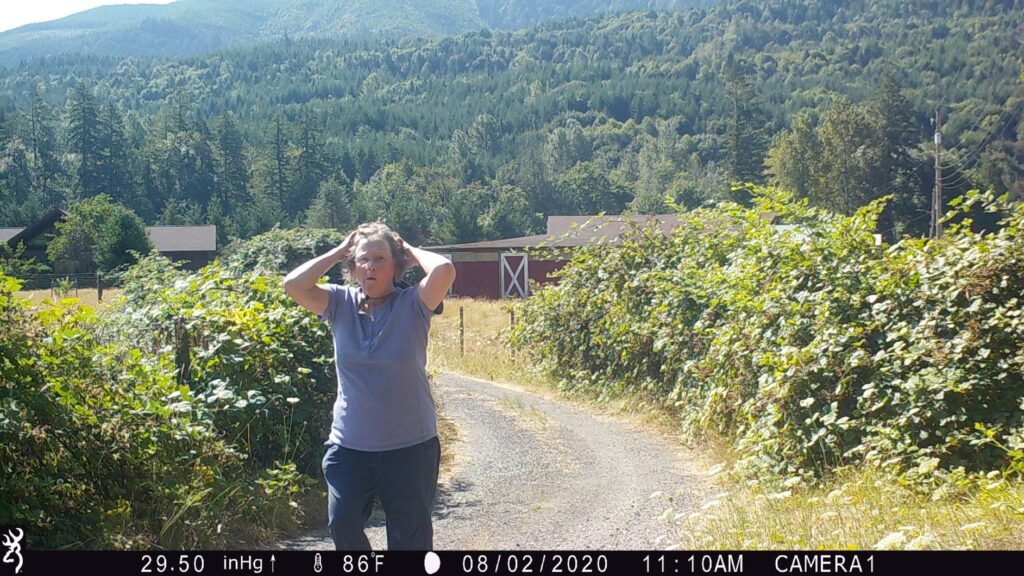
But thankfully, I did make it home. I was physically weak for some time afterwards, and we were both emotionally shaken.
In mid-August, a new problem arose. I developed a large, red lump on the side of my left ankle. It was roughly the size of a tennis ball, cut in half and painted red, stuck onto the side of my leg. Jeanette, who is a retired nurse, was concerned that it was cellulitis, a potentially dangerous infection. I did not have the emotional energy to deal with it, and tried at first to ignore it, hoping it would just go away.
Then came Labor Day, 2020. Our farm is located in the McKenzie River Valley in western Oregon. On the night of September 7th, Labor Day, there were high winds. We’d been planning to grill lamb burgers that night, but changed our plans and threw together a simple meal inside because of the wind. About 8:30 PM, our power went out. We learned later that about ten to fifteen miles upriver, the winds had knocked down a power line, and started a wildfire that spread rapidly, driven by the wind. A small town called Blue River, close to the origin of the fire, was completely destroyed during the night, and emergency alerts went out for residents downriver to evacuate.
We went to bed that night blissfully unaware of what was going on. Our farm is in a cell phone dead zone. When at home, our cell phones depend on our household Wi-Fi system to operate, and that died when the power did.
We awoke the morning of September 8th to a surreal view. The sky was a dull, yellow-gray haze. The sun wasn’t visible. The ground was covered with charred, blackened leaves and pine needles.
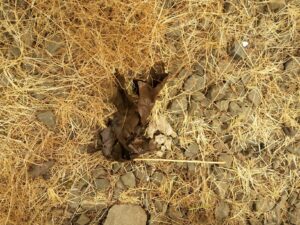
Charred leaves littered the ground.
We walked up to the street to check our mail and paper, and noticed that the neighborhood seemed deserted. As we reached the mailbox, my cellphone began screeching an alert tone. The message said, “Wildfire. Code 3 evacuation. Go Now!”
A few moments later a police car, from the nearby city of Springfield, came driving slowly down the street. The officers stopped, and asked what we were doing—were we waiting for someone to come pick us up? When we said no, and explained that we really didn’t know what was going on, they said a wildfire was spreading rapidly down the valley, and we needed to leave as quickly as possible.
As quickly as we could, we loaded our car with what we thought were essentials: changes of clothes, important documents, dog food for Sigrid, our Border Collie, etc. For some reason, I loaded all of our emergency lanterns and batteries we kept on hand for power outages. I still don’t understand that thought process. There was nothing we could do for our chickens and sheep, other than hope they would make it on their own. Our property is mostly open pasture, which is grazed by the sheep, so if the fire did reach it, hopefully any burning would be a relatively low-level grass fire.
We eventually ended up in a motel in Eugene, roughly 30 miles from our home. Even that far away, the smoke was so heavy that people were warned to venture outdoors as little as possible.
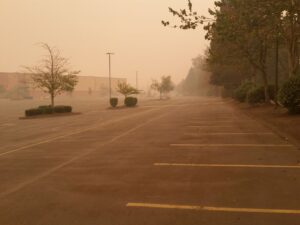
The smoke was heavy in Eugene, thirty miles away from the fire.
We lived in the motel in Eugene for eight days. After the first day or so, we discovered geographic maps available online that were updated daily, and showed the progress of the fire. We could zoom in and see how close it was to our farm. Although it came quite close, burning the top of the mountain ridge right behind us, fortunately it never reached our land.
The restrictions of the ongoing pandemic complicated our evacuee life. Most restaurants were open only for take-out. We ventured out of the motel room only briefly, once or twice per day, to take Sigrid for walks or to pick up food. Netflix was a very welcome companion.
The fact that we were already in Eugene—plus the fact that my leg was becoming increasingly painful—did lead us to see our primary care practice and begin the odyssey of trying to figure out what was going on with my leg and treat it. The initial diagnosis agreed with Jeanette’s worry—probably cellulitis—and a short course of antibiotics was begun.
Finally, on September 16th, we learned that residents of the valley, up to milepost 19 of the McKenzie Highway, were allowed to return to their homes. Our farm is literally at milepost 19. We gratefully made our way home. By the time we arrived, the power was even back on, although the contents of our refrigerator and three freezers, including most of the summer’s crops we’d processed and frozen, were spoiled from eight days without power.
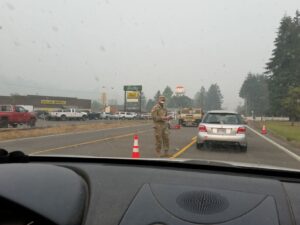
Approaching a National Guard checkpoint as we returned to the Valley on the 16th.
The photo below, showing the burned ridge-top behind our home, shows how close the fire came. The wildfire, officially named the Holiday Farm Fire, burned approximately 25 miles of the McKenzie River Valley. It spread almost 20 miles during the first night’s wind storm. Fortunately, after the first night, the high winds died down and the fire moved from the valley floor up onto the mountain ridges on either side of the valley, away from most homes and communities. But vast areas of forest were burned. And in the fire’s aftermath, extensive salvage logging—a controversial practice—is now occurring. Every day, all day long, empty logging trucks race up the McKenzie highway past our farm, and return carrying the blackened trunks of trees, many huge, old growth ones. Vast areas of forest are being transformed into barren clear-cuts. It will be decades before this once pristine forest valley recovers, if it ever does.
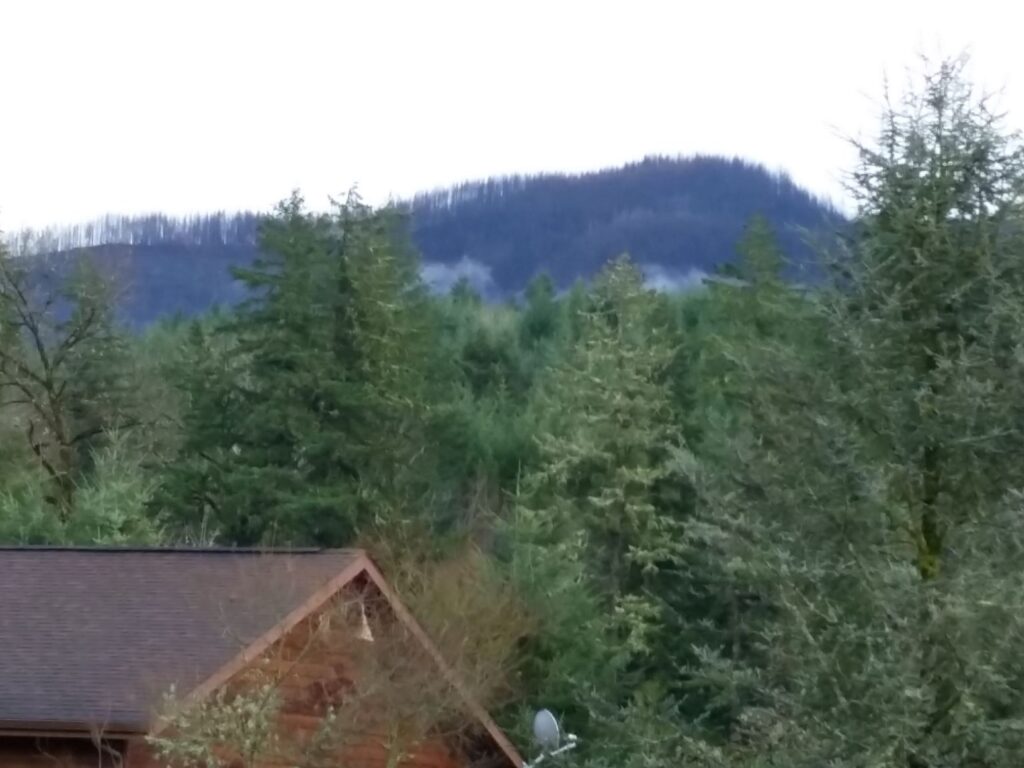
But the fire was not the last of our 2020 troubles. The issue with my leg—eventually it spread to both legs—has proved to be a “stump the doctors” mystery. Repeated bloodwork lab tests, a biopsy, and an MRI have all been inconclusive, but the condition, whatever it is, has gradually gotten worse. Multiple medications, aimed at theorized possible causes have mostly proved unsuccessful. By New Year’s Day, both legs had severe skin eruptions and discoloration, swelling, and the ankle and knee joints were painful and swollen, to the point where I could barely fit shoes on my feet.
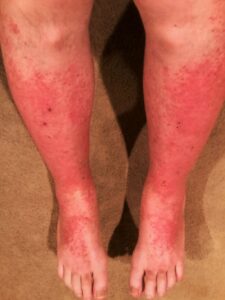
Things are a bit better now. After researching the National Institute of Health’s Rare Disease site, I suggested to my doctor that possibly I could have Brucellosis, a bacterium carried, often asymptomatically, by various types of animals, including sheep—we have a herd of heritage sheep. By this point she was willing to give any reasonable theory a try, so ordered blood tests to look for the Brucella antibody, and put me on a long-term program of Doxycycline, the antibiotic used to treat Brucellosis. Although the blood test came back negative, the antibiotic has gradually reduced the inflammation in my legs, to the point where there is almost no swelling or joint pain, and the skin inflammation has receded to just the areas around each ankle. So, although at this point we still have no idea what the condition in my legs is, it does seem that, due to the improvement brought about by the antibiotic, I have some kind of systemic infection., although it is a mystery why signs of infection do not show up in the lab tests. I am still a long way from well, but at least, for the first time in a long time, the condition of my legs seems to be heading, though slowly, in a positive direction.
So that was our hard year. Jeanette and I still find ourselves feeling emotionally, and often physically, exhausted many days. But we made it, and are keenly aware that in this past horrible year, and its continuing effects in the current one, many people did not, and many others are still struggling to survive. It is too often uttered as a cliché, but our thoughts and prayers are with you all. And on the bright side, a brush with mortality is a strong motivator to complete things still undone. Book 5 is on the way, and book 6 will follow.


Hang in there mate, i feel that anything else i say would sound empty and disingenuous. Just know that im rooting for you.
Thanks very much. This year has gone much better. I’ll be posting an update soon, and am still planning to finish writing book 5 by the end of this year.
Hello i just wanna let you know how happy i am to here you doing better i myself have reread your books meany times i started them when i was in highschool and have since continued to listen for the next release as much i would like to get your next book as soon as possible as a loyal fan i want you to know that your health is much more important take your time and live your best life rome wasn’t built in a night. You are an amazing writer and i hope the next years see you on the road to full recovery!
Forgive my horrible grammar!
Thank you so much for your kind words, Preston. I’m happy to report that other than the normal effects of another year’s wear and tear at this age, I’m back to good health. And, I am determined to finish writing book 5 this year. The summers here on the farm are always too busy to allow time for writing, but it’s thankfully winding down now, and I’m looking forward to submersing myself once again in Halfdan’s world.
Jud,
So I literally love your books so much and the series was actually the first set of books I ever read, 1 of the few I have ever read and the only one I have read more then once (6 now about to be 7 in preparation for book 5). I am commenting you in hopes of finding out if you have a due date for the book or not?
Enthusiastic reader,
Justin
Thank you, Justin. I’m glad you enjoy the books so much and I’m very flattered that you’ve reread therm so many times. Spring and summer are the busiest times of the year here on our farm, working with the garden and orchard, and this year tending to the sheep herd is more challenging and time-consuming because of the severe drought we’re having, so the amount of time I’ve been having to work on book 5 has been much lower than in the early months of this year and the latter part of last year. But I still plan to finish writing it by the end of the year, and hopefully will do so with enough time to also publish it this year. The publishing process takes at least a month, sometimes longer. I’ll try to keep giving updates more regularly as we get into fall.
I love your books- and check in with your site to find out when the next Strongbow is coming. I use audiobooks as a coping tool for distracting myself from my own challenges. I hate that you have suffered so much, but your openness about your trials helps me feel less alone. God Bless you; I hope your health continues to improve and that you quickly get some relief. You are long past due for some good luck!
Sorry about the challenges you are dealing with, but I’m very glad my sharing of troubles has helped you feel less alone. So far this year has been far better than 2020 for me. I’ve been working hard at regaining the amount of fitness I lost over the course of last year, and as always on our farm, the spring is exhaustingly busy as we push to get our garden in. But I am still on track so far to finish book 5 this year.
My god Jud, all that and you are still persevering. You have the heart of warrior sir. I cannot believe that you actually had to diagnose yourself! What the heck is the point of medical school if they aren’t going to think outside the box in a tough case like yours. Maybe I’ve just watched too much House but that is seriously disappointing.
Well, my “diagnosis” proved not to be correct, given that the blood test for Brucella antibodies came back negative. Just last week we tried another possibility, Lyme Disease (I was bitten by a tick in mid-December), but that, too came back negative. What is baffling is that I’ve had repeated blood tests, including again last week, looking for signs of infection, such as elevated white blood count (and also looking for markers of an autoimmune disease, and other possibilities), but the tests always come back normal. However, I’m still on the antibiotic Doxycycline, and my legs are continuing to improve–for which I’m very thankful–so it sure seems like an infection is involved. Like I said, it’s a real “stump the doctor” case.
Judson, please let us know if there is anything we can do to ease your burdens. Your fans want to have your back. All the best to you and yours.
Thanks. I think it’s going to be a better year this year.
I really wish you much better health in 2021!!!! You and you family stay safe and try to enjoy the fine monents in life.
Stefanie Schuermann
Thank you, Stefanie.
Wow, Judson, years don’t come much tougher than that! I am humbled by your attitude, coping with all of those things and still finding time to write. I am a fan of permaculture and one of their tenents is to turn a problem into the solution but even they would be taxed by your problems last year.
On the vole issue, we had problems (here in England) with voles this year but nowhere near on your scale, they were eating root crops and brassica but left our raspberries and asparagus alone. I understand that they are prone to population explosions and we have done our best to encourage their natural predators, owls, grass snakes, weasels, kestrels but predator numbers always lag behind prey numbers. Perhaps a good ratter dog might help, Jack Russell’s are supposed to be excellent.
Anyway I hope your 2021 goes a lot better, onwards and upwards eh?
Thanks, Steve.